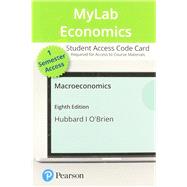For courses in the principles of microeconomics.
This ISBN is for the MyLab access card. Pearson eText is included.
An evidence-based approach to economics
Throughout Macroeconomics, 3rd Edition, authors Daron Acemoglu, David Laibson, and John List use real economic questions and data to help students learn about the world around them. Taking a fresh approach, they use the themes of optimization, equilibrium, and empiricism to not only illustrate the power of simple economic ideas, but also to explain and predict what’s happening in today’s society. Each chapter begins with an empirical question that is relevant to the life of a student, and is later answered using data in the Evidence-Based Economics feature. As a result of the text’s practical emphasis, students learn to apply economic principles to guide the decisions they make in their own daily lives.
Personalize learning with MyLab Economics with Pearson eText
This flexible digital platform combines unrivaled content, online assessments, and customizable features to personalize learning and improve results.
Pearson eText is an easy-to-use digital textbook available within MyLab that lets you read, highlight, take notes, and review key vocabulary all in one place.
NOTE: Before purchasing, check with your instructor to confirm the correct ISBN. Several versions of the MyLab® and Mastering® platforms exist for each title, and registrations are not transferable. To register for and use MyLab or Mastering, you may also need a Course ID, which your instructor will provide.
Used books, rentals, and purchases made outside of Pearson
If purchasing or renting from companies other than Pearson, the access codes for the MyLab platform may not be included, may be incorrect, or may be previously redeemed. Check with the seller before completing your purchase.











